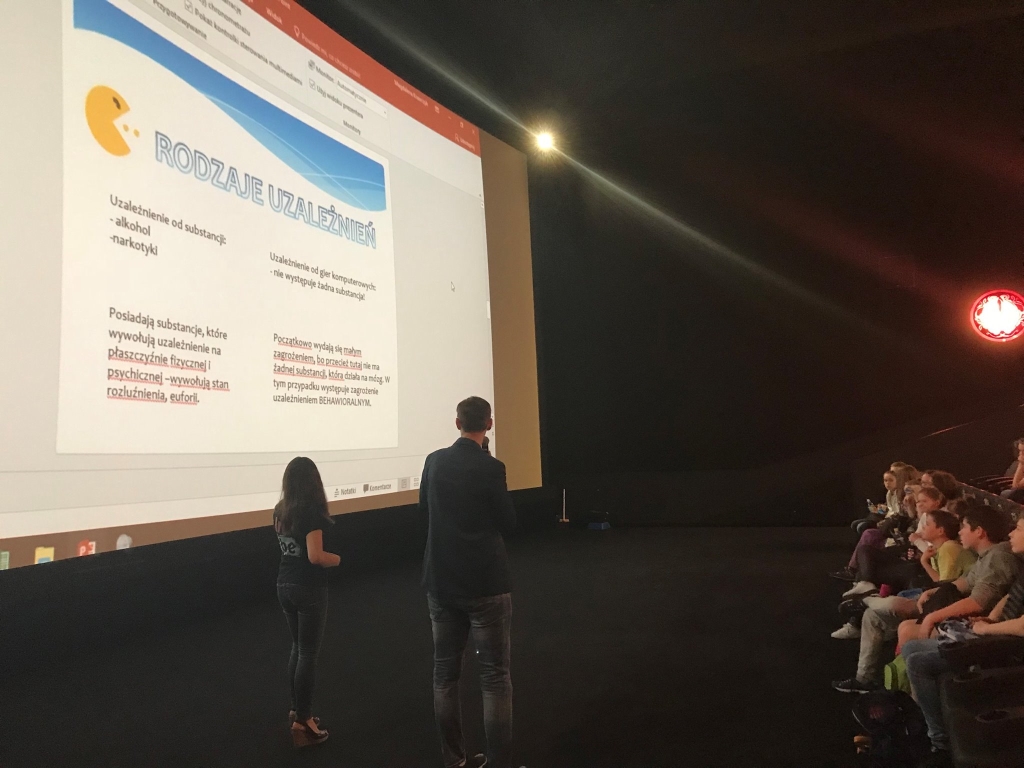Multikino
Today we had the pleasure of running the "Intelligence in the Web" workshops for the 7th class. It was a very nice group! We are happy that the awareness of cyberthreats is growing. The students were happy to talk to us and answer questions. We hope that thanks to our workshops they will be even safer in the virtual world. Greetings and see you!





How to detach your child from the computer and TV
Modern technologies have absorbed the rest of our lives and have become a facilitation of work, learning, and variety of games and free time - ours and our children. Internet and television are the most powerful channels of information flow and access is now very easy. Its availability has revolutionized us, and although we are aware of it, we often say enough! Common sense tells us that there are other forms of spending free time.
How do your children spend their time?
• Once he has shut down the computer, he surfs the Internet on his smartphone,
• Tablet is good when they’re bored in the car,
• In free time, it's time for TV, maybe Playstation or Xbox?
• On the hand - in case of a smartwatch,
• Mp3 works well in your ears.
Commonly and sensibly, we must be able to detach children from the abovementioned novelties and technological gadgets at certain times of the day and circumstances. Although it can be quite difficult. What can we do in this? There are some rules below how to detach your child from technology.
1. Give your child time - it's priceless. Just yes, you can distract him from technology.
◦ Why? - The child demands attention, if you focus on it, it will feel important. Sit next to, be with your child, get interested in what he/she did today, learn what, learn about little things and join in with his fun, even the multimedia one, and soon you will change it to another one.
2. Bet on activity and fun! Children love it! Walk, bike, rollerblading, or maybe fun in the wild west or the ball of princesses?
◦ That's it! Feel like a child and join the strangest games that bring you closer. The child will certainly choose the perspective of common madness rather than boring and static watching cartoons.
3. Show your joy from the fact that you spend time with your child!
◦ The child senses insincerity and appreciates authentic manifestations of behavior. Just allow yourself to spend time with your child. A pile of laundry, a two-course dinner with an appetizer and documentation files will wait for 30 minutes and certainly the world will not collapse. The joy of shared moments is the greatest happiness for the child.
4. Talk! As much as possible, honestly and truly - simply.
◦ Conversation is a daily close meeting. Discuss on various topics, ask about your child's opinions in various areas and matters.
5. Teach the child that time spent together is priceless.
◦ This is the most valuable thing you can give your child - your time. Let the child see that on a free Saturday, you prefer to rolerskate with him or go for a picnic with the whole family, instead of spending the afternoon alone in a shopping mall.
6. Challenge? A day without new technologies?
◦ Children enjoy such experiments but we have to play with them.
◦ A family trip with phones off, no computers, tablets and TV can be a fantastic experience.
7. Bet on the family and set a good example! Do not expect changes if you cannot detach yourself from the screen and the phone or TV.
◦ No matter what you are working on, your child will follow your example. Another season of your favorite series? Hours spent in front of the TV screen, we teach that our children.
8. Put the child in the role of an expert in technological innovations. Show him your appreciation as part of positive actions made with the use of a computer.
◦ Praise the choice of a television program or good production - give your child good directions. It will be information for the child, in which directions it is worth moving on the level of new technologies, and for you the opportunity to learn about this world from the inside. If you appreciate the effort put in it, your child will certainly invite you again.
9. Everything is for people, but moderation and common sense are useful always and everywhere.
We will appreciate the fact that our children grow up in the 21st century, full of technological novelties, extra gadgets and great devices. Let's not forget, however, what is family warmth, love and closeness and the warmth of everyday life, which we cannot find on the screens of any devices available today. If we are afraid of a competitor and cannot detach the child from modern technologies, let us try to implement the principle - more ourselves. Even today give your child something more valuable than the media offer - time, attention, interest, warmth and love. The child will always choose what is closer to him.
Bibliography: Myśliwiec K. (2014), Współczesne technologie informacyjne źródłem przemian zintegrowanej edukacji wczesnoszkolnej [w:] Edukacja – technika – informatyka, red. W. Walat, W. Lib, Rzeszów. Uniwersytet Rzeszowski.
Jegier A. (2016), Czas wolny małych dzieci w świecie realnym i wirtualnym. Engram
Coach, Mentor? - How (not) to motivate children?
"Motivation" entered into the search engine gives almost 10 million results. No wonder - it finally stands by all actions. Skillfully used knowledge about it may encourage you to take or give up activity. How to help your child manage their own motivation resources and not to make them dependent on prizes?
Motivation has mainly two faces:
• External - is associated with the expectation of reward for their actions - going to work is motivated by a salary, drawing in a kindergarten - despite the honest reluctance to paint with paints - can end with a good assessment or praise from favorite teacher.
• Internal - the effort is made not because it leads to a tangible effect, but to the pleasure of doing something and the internal reward (joy, satisfaction).
Modern theories of motivation suggest that both types can co-exist in different proportions - this is important information in the context of understanding children's behavior.
Unexpected change of places
Ola, a lover of evenings spent with a brush and paints, starts getting a few zlotys from her parents for each picture. She likes this layout and starts working at a dizzying pace, producing several drawings every day. Parents after some time forget about rewarding the artistic efforts of their daughter and stop giving her money. Shortly after that, Ola leaves her painting corner and becomes interested in playing hockey. What happened? It would seem that the girl's motivation has disappeared. It did not happen, it just changed - from internal to external. And external motivation depends on rewards coming from the environment, not internal ones like joy. Their lack caused Ola's resignation from her beloved hobby. Classical psychology studies show that the activity for which we receive a salary ceases to occupy ourselves for pleasure. The prizes awarded for commitment and results reduce the level of internal motivation.
Acceptance, appreciation, rewarding - delete as appropriate
What positively influences internal motivation is positive feedback. Feedback on the child's activities, appreciation of his efforts and praise for commitment are a recipe for strengthening internal motivation without the risk of rewarding for rewards. Because the real willingness to act really does not need much to develop further. And what about children who do not engage in attractive or valuable activities? The need for action and development in the most popular classification of needs, the pyramid of Abraham Maslow, stands for a more important need - safety, physiological satisfaction. Taking employees away from their salary means not meeting a fundamental need, which leaves the motivation to act in the background. Similarly, it can be with children who insist that they will not brush their teeth or play with their cousins at a party - it is worth checking if they are not under stress due to unmet needs. It is worth checking out what prevents your child from becoming involved - and help him enjoy carefree action.
Bibliography
Deci, E.L., Koestner, R., Ryan, R.M. (1999). A meta-analytic review of experiments examining the effects of extrinsic rewards on intrinsic motivation. Psychological Bulletin, 125(6), 627-668.
Sekuła, Z. (2008). Motywowanie do pracy: teorie i instrumenty. Warszawa: Polskie Wydawnictwo Ekonomiczne.
Sleep hygiene - take care of a good night's sleep
A sufficient sleep is one that lasts long enough to feel it (defined in Mayo Clinic). In the US National Sleep Foundation study (2000), 65% of respondents declared that sleeping did not meet these criteria, and 50% complained of poor performance and creativity at work due to sleepiness. All these changes in overall quality and total sleep time in society are probably the result of socio-economic development - the pursuit of professional success, the priority treatment of work and the imbalance between work time and private time. Sleep deprivation is a price that many people pay for these changes because they think it is a small part of life. The effects of this price, often serious, are felt much later when it may be too late. Meanwhile, adequate sleep improves learning and problem solving. "Sleep is for the weak" this trend is slowly losing its importance, but it is still a very slight change. To achieve a balance between sleep and other spheres of life, you need to find out what is the appropriate sleep hygiene and what affects its quality. Knowledge about the hygiene of sleep turns into sleep practice, and thus improves the quality of sleep.
Sleep hygiene can be disturbed by two factors:
- irregular sleep and wakefulness schedule,
- disturbing sleep behavior and environment.
The following issues should be taken care of in order to maintain proper sleep hygiene:
1. A comfortable physical environment in which a person sleeps (bed, mattress, pillow, adequate bedding, bedroom - properly illuminated, optimal room temperature);
2. We do not do any important work before bedtime (payment of bills, learning, etc.);
3. We limit the stimulation of activity just before bedtime (e.g. playing video games or surfing the Internet);
4. We do not use substances such as tobacco, alcohol or caffeine within 4 hours before sleeping;
5. We do not plan anything in bed;
6. We do not eat in bed;
7. We do not do tiring exercises within 1 hour before going to sleep;
8. We are not stressed out, furious, upset.
It is worth taking these few points regarding sleep hygiene to heart and try to implement them. This way we increase our effectiveness and give a good example to children that sleep is important at every stage of human life.


